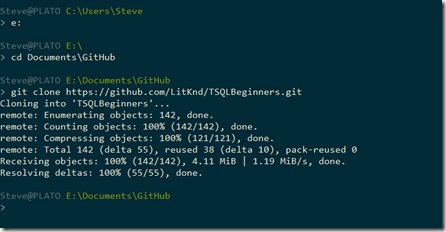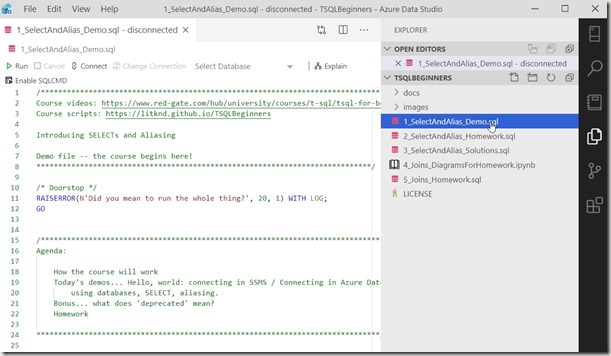As a part of the Redgate Community Circle, giving back in this strange time, each of the advocates for Redgate is teaching a free course. We’re doing this live each week, according to this schedule:
- Mondays – Intro to SSRS with Kathi Kellenberger
- Tuesdays – Query Performance Tuning with Grant Fritchey
- Wednesdays – Basic T-SQL with Kendra Little
- Thursdays – Live Stairways, DAX and Power BI with me.
I decided to watch a class of each of the others’ work and write about it. This post looks at the first class from Kendra Little on basic T-SQL.
Basic T-SQL
I know a lot of T-SQL, but I also don’t know a lot. I’m good, maybe above average, but not a great query writer. I learn all the time from others, and often find something interesting in basic presentations. I’m also always looking to see how others teach basic topics to improve my own skills.
Kendra has done an interesting thing with putting her course on GitHub. That’s a great idea, though for mine, I am following articles on SQLServerCentral. Having a good outline and resources for students is a good idea, and everyone ought to be able to use a VCS, including GitHub, so I like putting pages here and code in a repo.
Why is that good? This is what I did to start following Kendra’s class:
Now I can open the first script in ADS. On top of seeing how Kendra teaches, I get to practice some ADS stuff.
I like the doorstop at the end, and I’ll have to think about that for my demo scripts. I’ve accidentally run the entire script too many times.
Kendra walks through a number of query concepts with a series of basic SELECT statements, including an emoji for a column alias. I’m glad she lets you know which items are not recommended.
The first course is helping you understand some of the ways in which you can get data from tables. You do need to have a slight understanding of what a table is, but Kendra helps you learn some of the strange ways that you can put together a statement. There is a lot to cover, but this should help someone that wants to learn some basics get started.
There is also homework, included as part of the scripts in the course. The questions are at the bottom, and called out. A good way to get you to practice. I should do this for my work in places as well.
Pass this course along to someone that needs to get better at T-SQL. It’s not too fast or hard, and will let them be sure they have a grounding in good ways to write queries.




